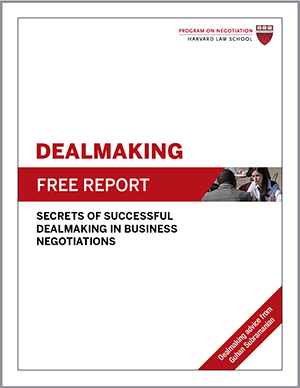Adapted from “When You Hold All the Cards” by Guhan Subramanian for the September 2005 issue of the Negotiation newsletter.
Consider the following hypothetical negotiation scenarios, in which you seem to hold all the cards:
– One of your customers has just landed a lucrative new contract, and you’re the only supplier who can add a critical component to that customer’s production process.
– You own a controlling interest in a publicly traded company and are seeking to buy out the minority shareholders and take the company private.
– You sell umbrellas, and a man in a well-tailored suit rushes into your shop at the start of a downpour.
What’s the problem, you might reasonably ask?
Concerns about violating your own ethics or harming your reputation might limit your willingness to extract as much gain from the trade as you can, but these factors won’t prevent you from at least getting a very good deal.
Yet, as Guhan Subramanian discusses, being the more powerful party in a negotiation doesn’t guarantee a free ride.
Specifically, legal rules may constrain your actions in three basic ways.
– To protect the weaker party, the courts might second-guess the terms of the deal if they seem too onerous.
– The courts might read additional terms into the deal that favor your counterpart even if neither party considered these terms when signing the deal.
– The courts might impose procedural constraints that prevent you, as the stronger party, from abusing your bargaining power.




